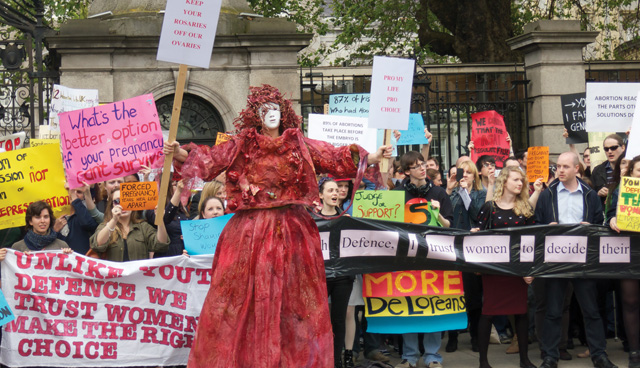Eighth Amendment referendum stands alone


The Taoiseach has announced that amongst eight referenda to be held over the next two years, the referendum on the Eighth Amendment is to be a standalone vote held in May or June 2018.
The framing of the question, whether the Eighth Amendment, which gives equal rights to the life of an unborn child and the mother, should be removed from the constitution or amended, will be determined by the all-party Oireachtas committee expected to report by Christmas.
Taoiseach Leo Varadkar pointed to May or June of next year as the earliest opportunity for the referendum but added that he would not like to see it delayed beyond then. Some TDs were critical of the proximity of the date to the expected visit of Pope Francis to Ireland during the World Meeting of Families held between 21-26 August 2018.
The referendum is partially the consequence of a long-standing ‘Repeal the Eighth’ campaign, which contends that Ireland holds some of the most restrictive abortion laws in Europe. Currently, the termination of a pregnancy is only permissible in Ireland where there is a risk to the mother’s life.
It is one of five refferenda set to be staged in 2018, with a further three scheduled for 2019:
2018
Referendum to repeal the Eighth Amendment
Whether the amendment which places the life of the unborn child on an equal footing to the mother should be removed or amended.
Referendum to remove blasphemy as an offence
Whether the offence of blasphemy, meaning it is illegal to publish or utter a matter that is grossly abusive or insulting in relation to matters held sacred by any religion, should be removed from Article 40.6.1(i).
Referendum on women’s place in the home
Whether the constitution should be amended or there be a removal to the lines including “The State shall, therefore, endeavour to ensure that mothers shall not be obliged by economic necessity to engage in labour to the neglect of their duties in the home”. It is recommended that the wording is made gender neutral to include carers in and outside of the home.
Referendum on whether Ireland should have directly elected mayors
Whether cities should follow the examples of European counterparts and directly elect their own mayor. The original concept was for Dublin but consideration is also being given for extension to Waterford, Limerick and Cork.
Referendum on giving Oireachtas committee more powers
Whether it is appropriate to give Oireachtas committees powers to make findings of fact.
2019
Referendum to reduce the divorce term
Whether the divorce term should be reduced from four years to two.
Referendum to extend voting rights to emigrants
Whether Irish citizens living outside of the country, including the North of Ireland, should be allowed to vote in presidential elections.
Referendum to reduce the voting age
Whether the legal voting age should be lowered to 16-years-old.
While no specific dates have been given for the votes, it is thought that those referenda scheduled for October 2018 will coincide with the presidential election. For those in 2019 there is an opportunity to hold the referendums on the same day as the local and European elections.
It is estimated that referenda cost around €12-€14 million to process, with an extra €2 million for the Referendum Commission.
The Taoiseach previously ruled out the proposal to stage a ‘referendum day’, stating that too many questions on one day could be confusing and whether Varadkar will campaign on any of the referenda is to be decided on a case by case basis.
“Any amendment to our Constitution requires careful consideration by the people. They should be given ample time to consider the issues and to take part in well-informed public debate,” he said.
“Setting a timetable for the referenda to be held over the next two years will allow all involved in campaigning on the issues to plan ahead and to facilitate that public debate.”
Critics have hit out at some notable omissions form the referenda proposals list, including promised referenda on the establishment of a United Patent Court, changes to how the Ceann Comhairle is elected and a vote on the public ownership of Irish Water.
While the Taoiseach confirmed the Government’s decision to defer the timing of a referendum on Ireland’s participation in the United Patent Court, he was less clear about a timeline around Irish Water, stating that the Government was “still considering the holding of a referendum”.





